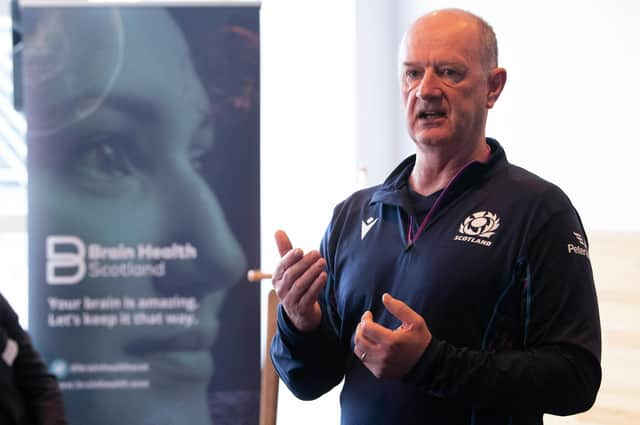Dr James Robson responds to head injury study - concern, outside expertise, next questions


The study, which was led by the University of Glasgow and published on Tuesday night, compared health outcomes among 412 male former Scottish international players and over 1,200 matched individuals from the general population.
The research showed that the increased risk ranged from around a doubling of risk of a dementia diagnosis to an over 10-fold increased risk for motor neurone disease diagnosis.
Advertisement
Hide AdAdvertisement
Hide Ad“On the face of it, it is concerning,” acknowledged Robson. “But that concern has to be taken with the view that it is a relatively small study of a small population. So, there are various things that may lead into that and what we need is outside expertise to come in and take that information about increased risk and tell us what the next questions are.”
Robson welcomed the news that MND Scotland is to convene an expert group, in light of the study's results, to provide advice to Scottish Rugby on how screening could be developed and built into health checks for current and former players.
“The offer of being able to speak to some of these eminent people which will inform what we do as a union and as a sport is really welcome,” he said. “I will work with anybody, and it would be particularly good if we could get an international expert panel because this may not just be pertinent to Scotland.
“We need to find out if this is a cluster of some sort, a statistical anomaly, but you’ve to take it on face value because that way everybody treats it with the utmost seriousness.”
Professor Willie Stewart, lead author of the paper, has criticised rugby’s response to the risks associated with brain injuries.
"Rugby has talked a lot about head injury management [but] I think those conversations have gone on a while and progress is pretty slow," he said on Tuesday. "I think this should be a stimulus for them to pick up their heels and start making pretty dramatic changes as quickly as possible to try to reduce risk.
In response, Robson highlighted some of the work which has gone into researching this issue and reducing risk.
“We’ve been doing work for years. We don’t stand still. For example, we launched the brain health clinic in April, so that our men and women ex-internationals can have their brain health examined using the best knowledge we have at the moment, and a plan to mitigate risk going forward can be formulated,” he explained
Advertisement
Hide AdAdvertisement
Hide Ad“In March, World Rugby announced five massive pieces of research looking at injury rates, concussion rates and preventative strategies. That kind of press doesn’t get the traction that this kind of headline gets, and yet it is all integrated and it is all about what are we doing to make this game safer.
“We’ve had the evolution at elite level of pitch-side care, namely HIA [Head Injury Assessment], and we’ve all evolved pitch-side care courses that the general public can tap into.
“Over the years, training sessions have got much shorter. There was an immense piece of work out by World Rugby three and a bit years ago, before the last World Cup, about contact work and how to monitor it, and how to modify it.”